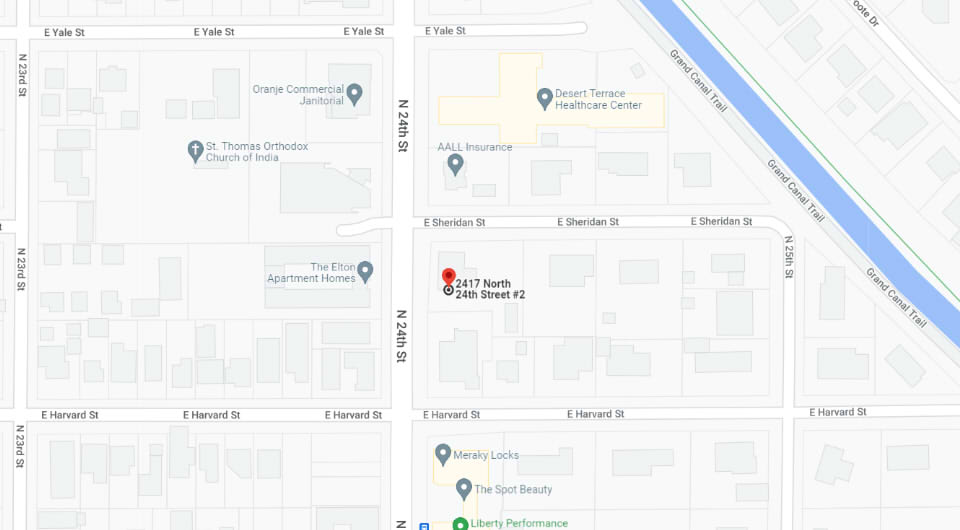If a heart attack is misdiagnosed, the patient might not receive the immediate medical care that they need. Too often, doctors will downplay the worries of a patient about a serious medical condition in the emergency room or over the phone by attributing them to something minor, like indigestion or anxiety. The results could lead to wrongful death or irreversible heart damage. If a misdiagnosis of a heart attack results in the loss of life or serious injury, you can contact the Phoenix Personal Injury Attorney Law Firm for help in seeking compensation.
Understanding Heart Attack Misdiagnosis
Not all errors that doctors make constitute medical malpractice. It can be challenging to hold a physician accountable in complex situations where the vast majority of doctors are unable to come up with a diagnosis. However, medical professionals are required to adhere to strict guidelines. If they don't, it's considered negligence and can serve as the basis for a medical malpractice case.
Failing to diagnose a heart attack is one of the factors that can establish a medical malpractice lawsuit, and an experienced medical malpractice attorney is aware of how it occurs. When treating a patient who has an unknown illness, doctors are required to adhere to certain guidelines.
These actions include the following:
- Reviewing the individual's medical background.
- Monitoring the differential heart diagnosis, dismissing potential illnesses one by one.
- Carrying out a physical examination and ordering any necessary tests.
- Taking note of all symptoms reported and evaluating how well they match diagnostic requirements.
- Referring the individual to a medical professional or anyone with more expertise when needed.
The most common deviations from these rules that doctors make involve not requesting the necessary tests, not paying attention to the patient's signs and symptoms, failing to check their medical history, misinterpreting test results, and assuming that the individual in question is in some kind of condition.
The Rate of Misdiagnosis of Heart Attacks
While the majority of emergency room doctors are qualified and cautious to thoroughly evaluate all signs and obtain medical records to identify potential risk factors, the research found that one out of every fifty heart attack victims present at the hospital's emergency room showing signs of a heart attack are mistakenly sent home.
The well-being of the patient could deteriorate significantly as a result of the emergency department doctors' mistakes. Most of these physicians are female or younger individuals. With the current obesity epidemic, a rising number of young individuals who were once deemed to be at low risk for suffering heart attacks are now showing signs of heart disease.
Misdiagnosis of heart attacks can include heartburn, pneumonia, anxiety, acid reflux, peptic ulcer, bronchitis, gallstones, or muscle tension. Missing a diagnosis can result in death or irreversible heart damage.
Common Misdiagnosis of Heart Attacks
A heart attack can lead to irreversible damage, such as scarring that impairs the ability of the heart to pump blood efficiently if it's not treated within one hour of the first sign of symptoms. A major heart attack misdiagnosis can have catastrophic consequences.
Unfortunately, doctors occasionally misdiagnose heart attack symptoms as being associated with other illnesses, both common and uncommon. This is particularly the case when they affect people who aren't often thought to suffer from heart attacks, such as young adults, women, and children.
Heart attacks are often misdiagnosed, and a few of the most prevalent ones are as follows:
- Indigestion.
- Heartburn.
- Acid reflux.
- Bronchitis.
- Esophagitis.
- Gallstones.
- Angina.
- Anxiety or panic attacks.
- Musculoskeletal pain.
- COPD.
According to studies, symptoms of heart attacks in women tend to be less often taken seriously than they are in men, which can lead to doctors failing to ask for the right tests to determine how well the heart is working.
Determining Liability
Experienced medical malpractice lawyers are skilled at demonstrating how a physician's negligence contributed to your deteriorating injuries or condition. A personal injury attorney is aware of the processes required to hold the physician or facility accountable and how to traverse the medical malpractice claims procedure.
In these circumstances, the two most important factors are as follows:
The Doctor Didn't Provide The Level Of Care Expected
Based on their training, experience, skills, and other qualifications, physicians and other medical professionals are required to offer a specific standard of care. They should similarly conduct themselves as other normal healthcare professionals in the same setting who have the same education and experience.
This duty entails adhering to the essential guidelines and instructions. A personal injury attorney can demonstrate this part by having other medical professionals with similar expertise analyze the case and figure out whether the healthcare provider offered the proper and expected level of care.
The Failure Caused The Injuries
A personal injury attorney needs to show how the delay in diagnosis contributed to the deterioration of your health or damage. If they are unable to demonstrate that the parties' failure to diagnose a heart attack caused you harm, they can't hold them responsible. This duty depends on the patient's medical history, tests, imaging scans, and expert medical evidence more often than not, while some circumstances make it easier than others.
Medical expert witnesses are often needed to support your case by demonstrating the presence of these two factors. A professional personal injury attorney can consult with specialists to determine what would have been appropriate, how your physician ought to have acted, and if medical negligence is believed to have taken place.
In most cases, victims have 2 years to file a claim against the party or parties at fault. However, in certain circumstances, additional measures are required. Waiting too long is not a good idea. As time goes on, it becomes increasingly challenging to build a solid defense and obtain just compensation. You can get in touch with a Phoenix medical malpractice lawyer right away so that they can start working on your case.
When Failure To Diagnose A Heart Attack Is Medical Malpractice
In Arizona, a physician who misses a heart attack in progress could be held accountable for medical negligence. Every emergency doctor should be aware of the different signs of heart attacks and the steps to take when they manifest because they are common and life-threatening incidents. Failure to follow the correct process could be considered a violation of the level of care that any qualified Arizona doctor is supposed to offer.
By bringing a medical malpractice claim against the physician or facility responsible for the misdiagnosis, you could be able to get financial compensation for the damages if you or someone you love had a heart attack that was not diagnosed correctly and, as a result, deteriorated their health or even cost them their lives.
However, you should know that all Arizona medical malpractice cases are complex and demanding, so you'll need the help of a medical malpractice lawyer who specializes in pursuing claims for medical malpractice.
An experienced heart attack attorney ought to:
- Understand the medical terminologies.
- Understand Arizona medical practice standards.
- Recognize the current medical techniques and diagnostic tests to detect heart attacks.
- Have access to medical experts who can examine medical records, provide testimony regarding levels of medical. care, and assist in building the case by substantiating and supporting the claim.
- Have a track record of successfully recovering medical malpractice awards for their clients.
Arizona's Statute of Limitations on Medical Malpractice
Arizona has a statute of limitations that sets a deadline for filing a civil claim for medical malpractice. You have the right to compensation if you or someone you know was injured or suffered harm while receiving medical care. An expert medical malpractice lawyer can assist you with the lawsuit filing procedure and proceed to work on the matter right away in the hopes of settling.
Under ARS 12-542(1), a legal case claiming malpractice by a medical practitioner or healthcare facility should be initiated within two years after the underlying cause of action emerges. This implies that victims of medical negligence have a two-year time limit, making it urgent and crucial to the success of the case to issue and file a complaint.
According to Arizona's discovery rule, a plaintiff who finds medical negligence after the two-year window can still be able to file a lawsuit. For instance, if surgery is done and the surgeon mistakenly leaves surgical material in the body, and it's found 6 years after the operation, the plaintiff can claim that the two-year period started counting when the surgical material was discovered.
A professional medical malpractice attorney will apply the rule of discovery to demonstrate that the plaintiff was unaware of the medical malpractice problem before the discovery stage. The case proceeds even when the two-year period has already passed after it has been established that reasonable and diligent attention was done.
If the victim is mentally handicapped or is a minor, additional exceptional exclusions could be used. In such cases, the "time limit" for the statute of limitations could be paused. Minors can file a lawsuit up to two years after turning 18 years old.
What a Personal Injury Attorney Can Do for You
A professional personal injury attorney knows how to build a compelling argument based on a heart attack misdiagnosis. It can be challenging to compile evidence to demonstrate something didn't take place, but a competent attorney deals with this procedure frequently and can record what occurred, who took part, and how it harmed you.
A personal injury attorney can consult with medical professionals to see what should have been done and what took place when the healthcare provider should have identified your issue.
You can rely on a professional legal team to handle every part of your medical malpractice case when you choose them, including:
Undertaking The Necessary Actions To Recognize Your Case
Lawyers can go into great depth about what happened to the victim, getting their perspective and making sure they comprehend the victim's goals. A personal injury attorney can evaluate the situation and determine the parties who are initially responsible. What the attorneys find enables them to choose the most qualified expert witnesses and seek their assistance in identifying any malpractice.
Obtaining Expert Opinions to Back Up Their Claims
A personal injury lawyer examines your pertinent medical records and requests that the experts they have identified review them. These experts evaluate the circumstances, offer their insight on the treatment given, determine whether a diagnosis was missed, and determine whether medical malpractice was at play.
They usually give the attorney an affidavit, which is a written report of their conclusions that are submitted under oath, and they often agree to appear in court if necessary. In other instances, they divulge information during a deposition, which is an oath-recorded, sworn declaration.
Seeking Justice
Your legal representative seeks justice on your behalf by filing a claim for damages against the hospital, clinic, or doctor responsible for your injuries.
He or she often gets compensation through:
- Reaching a settlement with the medical malpractice insurer.
- A jury trial verdict.
Getting Through The Legal Procedure To Get Compensated
A personal injury attorney will fight for just compensation and defend your rights at every stage of this procedure, so you can rely on them. A professional attorney is aware of the relevant legislation and how this procedure works. He or she is capable of meeting every deadline and submitting the required records to prove what took place and why you should be compensated.
If necessary, the attorney can file a lawsuit against the physician, the medical facility, or any other responsible person. If the trial is necessary or there is a chance that punitive damages could be possible, they will not back down. In addition to seeking just and fair compensation for the victims, a personal injury attorney could also want to make sure they get the maximum settlement possible if they've been the victims of severe medical negligence.
To ensure you receive full compensation for the damages, your Phoenix medical malpractice attorney will prepare a compelling demand letter to the liable party's medical malpractice insurer and will stand ready to argue the matter in court if a satisfactory settlement arrangement cannot be reached.
Types of Compensation Available For A Heart Attack Misdiagnosis
When a heart attack is not correctly diagnosed promptly, it can cause damage to the heart, problems, and at times even death. A doctor is responsible for paying damages if you or someone you know suffers as a result of their failure to order the right diagnostic tests, or if they misinterpreted or ignored the patient's symptoms and complaints.
You could be able to get compensation for either monetary or non-monetary damages:
- Costs associated with the current and future medical care.
- Paychecks lost and reduced earning potential.
- Suffering and pain.
A close family member can pursue a claim for wrongful death in a medical malpractice case if delays in treatment lead to the demise of their loved one.
Claims for wrongful death can also be compensated for:
- Funeral costs.
- Burial expenses.
- Earnings based on the number of working years the deceased would have had left.
- Benefits such as retirement and healthcare that are no longer available.
When a preventable heart damage or heart attack incident affects a family, the doctor who failed to provide the patient with the necessary care should make up for the error with a full monetary settlement.
Do Medical Errors Always Indicate Negligence?
It can be difficult to distinguish between a medical mistake that is not negligent and one that constitutes medical malpractice. Even when things run well in the field of medicine, the outcome being favorable is not always guaranteed. Additionally, if another reasonably cautious provider with a comparable background could have made the same medical error in the same situation, such a mistake doesn't necessarily constitute negligence.
A medical mistake could not be viewed as negligent if the person receiving treatment did not experience any negative effects as a result of the error. It could prove challenging for an individual to ascertain whether medical malpractice is at play in a given error. The reason for this is that to do their duties, modern medical professionals need unfamiliar and specialized language, procedures, and technologies.
Attorneys often consult with unbiased medical professionals who can clarify what went amiss and what should have occurred instead of thoroughly looking into a medical mistake and deciding whether medical malpractice transpired.
Find a Phoenix Medical Malpractice Personal Injury Attorney Near Me
If you or someone you know suffered avoidable injuries or the progression of a heart issue as a result of a doctor's failure to diagnose it, there are several legal options you can consider. You could be eligible for financial compensation to assist with the cost of your losses, other bills, and medical costs as a result of the injuries sustained.
To find out more about your legal options and the methods we use to seek justice in cases like yours, contact the Phoenix Personal Injury Attorney Law Firm today at 602-641-9589. Our Phoenix personal injury attorneys are prepared to assist you, as your issue is our issue.










